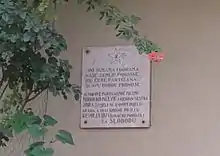March of the Siberian Riflemen
The "March of the Siberian Riflemen" (Russian: Марш сибирских стрелков, romanized: Marsh sibirskikh strelkov), or alternatively the "Siberian Riflemen's March", is a Russian war song from World War I and the Russian Civil War. It is believed that the song melody was composed by Yuri Cherniavsky in 1915 for recruitment, but it is possible that it circulated in Russia even before. Vladimir Gilyarovsky wrote text for the song, to help recruit Baikal Cossacks into the Imperial Army. His text has three versions. Peter Parfenov wrote the latest version of the song after the 1922 Battle of Volochayevka.[1] Many other songs use this same melody, like the French anarchist song "La Makhnovtchina"[2] and the Red Russian song "Through Valleys and Over Hills" (Russian: По долинам и по взгорьям, romanized: Po dolinam i po vzgoriam), among others.[3]
"Through Valleys and Over Hills" itself has many versions in other languages, including Serbo-Croatian, Greek, German, French, Hungarian, Hebrew and Kurdish among others. The song was adapted by the Yugoslav Partisans and used in World War II.
History
The lyrics were penned by Russian writer Vladimir Gilyarovsky and meant to inspire the Baikal Cossacks conscripted for World War I. Later, the song became an anthem to the Siberian Cossacks, who swore to the Russian Empire and kept fighting even when the areas free from the Bolsheviks had shrunk to Siberia and the Far East. The song was so popular that the Russian communists re-penned the lyrics to their favor. The song served as a march during the Russian Civil War for the White Army as the March of the Siberian Riflemen under the command of Admiral Kolchak after he established the anti-communist Provisional Siberian Government. The song also served as a commemorative march for General (then Staff Colonel) Mikhail Drozdovsky and the Volunteer Army, after the Iași–Don March.
After the end of the Russian Civil War, the song was popular within the RSFSR and the USSR, with communist partisan fighters in Yugoslavia and German-occupied Russia using the song. The song is commonly played by the Alexandrov Ensemble. In the Middle East, the Russian song also got Hebrew texts written by the poets Avraham Shlonsky - Halokh halkha hevraya - a translation after Alexander Blok, which in several mobilizing versions served the Zionist Socialist Hashomer Hatzair movement and the Palestinian Communist Youth (now BANKI) movement in the Mandatory Palestine and then in Israel - and Didi Menosi - Mul gesher hanahar - which is known in the interpretation by the Israeli Gevatron ensemble. The music was used also as the first melody for the anthem of Palmakh Jewish shock units in Palestine.[4]
Russian lyrics
March of the Siberian Riflemen
| Russian | Transliteration | English (Literal) |
|---|---|---|
Из тайги, тайги дремучей |
Iz taigi, taigi dremuchei |
From the taiga, the dorment taiga |
Through Valleys and Over Hills
| Russian | Transliteration | English (Literal) |
|---|---|---|
|
По долинам и по взгорьям |
Po dolinam i po vzgoriam |
Across the valleys and across the hills |
French lyrics
March of the Siberian Riflemen
| French | English |
|---|---|
Dans le froid et la famine, |
In the cold and the famine, |
La Makhnovtchina
| French | English translation |
|---|---|
|
Makhnovtchina, Makhnovtchina |
Makhnovtchina, Makhnovtchina |
Serbo-Croatian lyrics (Po šumama i gorama)

| Serbo-Croatian (Latin / Cyrillic)[5][lower-alpha 1] | English translation | |
|---|---|---|
|
Po šumama i gorama |
По шумама и горама |
Throughout forests and mountains |
Alternative version
Basil Davidson recites alternative lyrics as he heard them from Yugoslav Partisans in his 1946 book Partisan Picture:[6]
| Serbo-Croatian (Latin / Cyrillic) | English translation | |
|---|---|---|
|
Partizan sam tim se dičim: |
Партизан сам тим се дичим: |
I'm a Partisan; of that I am proud. |
Greek lyrics
| Greek | Transliteration | English translation |
|---|---|---|
|
Παρτιζάνοι προχωρείτε |
Partizáni prohoríte |
Partisans, move forward, |
Hebrew lyrics
| Hebrew | Transliteration | English translation |
|---|---|---|
|
היא עמדה אל מול גשר הנהר |
hi amda el mul gesher haNahar |
She stood in front of the river bridge, |
Notes
- Strophes marked in italics were also sung during the World War II, but do not usually appear in orchestral versions recorded later. The latter italic strophe (sixth from the top) was typically replaced by the fourth strophe instead.
- Alternatively in Serbo-Croatian: Neka znade / Нека знаде, lit. 'Let [them] know'
- Alternatively in Serbo-Croatian: da će kod nas slomit' vrat / да ће код нас сломит' врат, lit. 'That they will have their necks broken here'
References
- Dmitri Hrustalev 2013 on site Vesti.ru
- La Makhnovtchina Lyrics, retrieved 2022-11-01
- White Movement (1917–1923) "March of the Drozdovsky Regiment", retrieved 2022-11-01
- Zemereshet- Israeli site of Hebrew music
- "Po šumama i gorama". Zagreb: Antifašistički vjesnik. 22 December 2022. Retrieved 16 January 2023.
- Davidson, Basil (1946). "3.2. Spring 1944 Beyond the Danube: Srem Our Oyster". Partisan Picture. Bedford Books. OCLC 2019137.